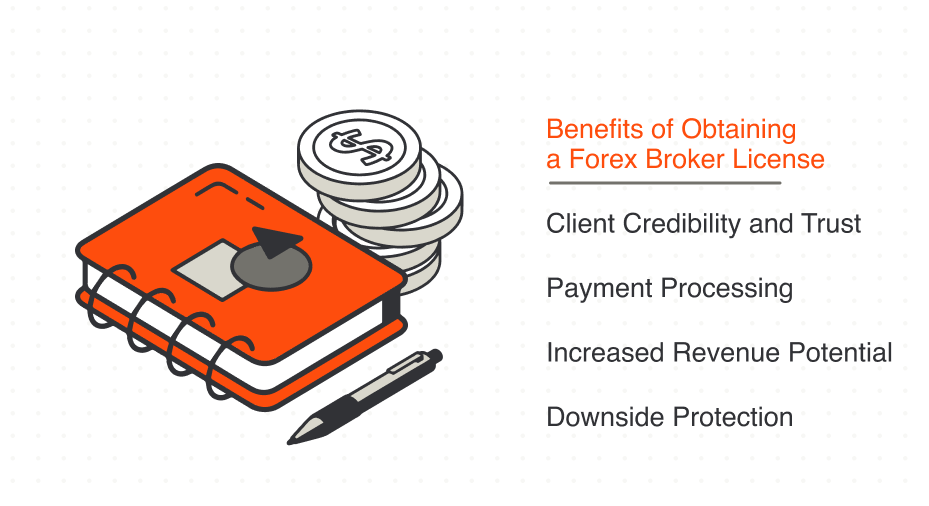Forex
8 minutes read
Oct 10, 2024
How to Get a Forex Broker License
What is a Forex Broker License?
A forex broker license permits a company to provide forex brokerage services legally. It is granted by financial market regulators in different regions worldwide. There are three main categories operating in the forex broker landscape – forex brokers, proprietary trading firms (prop firms), and introducing brokers (IBs).
Forex brokers hold client funds and execute client orders in the forex market on behalf of individual and institutional traders. They require licensing and are regulated. Prop firms trade solely using their capital with no client funds involved, so licensing is not mandatory but exists in some jurisdictions. IBs refer leads to forex brokers in exchange for commission but do not execute trades or hold client funds directly.
Financial regulators oversee forex brokers and the overall forex industry in their regions. Their objectives are to maintain fair and orderly markets while protecting investors through implementing disclosure requirements, capital standards, compliance procedures, and more. Obtaining authorization demonstrates operating with oversight leading to greater trust.
Benefits of Obtaining a Forex Broker License

1. Client Credibility and Trust
One of the main advantages of obtaining a forex broker license is that it lends credibility and trustworthiness to clients. Traders are more confident choosing a regulated brokerage as they know the operations are subject to oversight and must meet standards. This provides reassurance to clients that their personal details and funds are protected according to the regulator’s guidelines.
2. Payment Processing
Being a licensed entity allows brokers to establish better business banking relationships. Key payment providers are more open to facilitating deposits and withdrawals for authorized forex firms versus those without licenses. The ability to reliably process client deposits and payouts improves the overall funding experience and satisfaction and builds positive promotion.
3. Increased Revenue Potential
Regulatory approval benefits brokers through potentially higher client acquisition and revenue generation over time. The licensed status appeals to traders and helps brokers stand out from competitors. As obligations around areas like cybersecurity are fulfilled, safe trading platforms retain clients and attract referrals. Repeat customs and referrals translate to increased long-term earnings and growth.
4. Downside Protection
Regulatory oversight offers recourse should any issues occur with a licensed broker such as disputes over funds, insolvency issues, or other problems. Clients can seek compensation or resolution from the responsible licensing body. This provides reassurance for traders and encourages investing in under-regulated brokers’ supervision versus avoidance due to scepticism over unregulated alternatives.
In summary, obtaining a forex broker license conveys valuable accreditation. It strengthens credibility with clients while facilitating critical business processes. Strictly adhering to licensing requirements maintains these key advantages within the competitive industry.
What Is the Easiest Forex License to Get?
Vanuatu and Seychelles both maintain a minimum initial capital requirement of $50,000 that brokers must demonstrate before licensure. Not having to block a substantial sum is more suitable for starters with constrained accounts. Conversely, SVG exempts brokers from mandated capitalization entirely, eliminating a significant hurdle for underfunded pioneers.
All destinations advertise forex dealing license approvals within a 3-month standard window subject to completeness. Simple applications from respectable entities tend to receive approvals in 8-12 weeks. However, factors outside applicants’ control like additional requests could potentially extend the duration by 2-4 months. Thorough planning is prudent.
Post-approval, ongoing expenses differ between the locations. Only Seychelles levies brokers an annual 1.5% tax on revenue, leaving Vanuatu and SVG taxes exempt. Avoiding taxation preserves funds for reinvesting in growth and talent. Regulators in Vanuatu and SVG additionally exhibit flexibility and openness to new ideas. Conversely, Seychelles maintains strict investor protection standards comparable to developed centres. Pioneers require proactively engaging regulators regarding innovations.
Of the options, SVG emerges most advantageous for bootstrap ventures. Its lack of capitalization demands and lifetime tax waivers minimize barriers. Vanuatu follows as a budget-friendly alternative. More established companies may favour Seychelles for its reputable regulation over nascent admittance. Overall, comprehensive research and legal advice particular to plans indicate the best matches.
Requirements for Obtaining a Forex Broker License
Forex brokerages must satisfy varying criteria set by regulators such as capital levels, compliance protocols, technology infrastructure, and personnel needs to attain an operating license.
1. Company Setup
Incorporating an appropriate legal business structure is essential. Standard limited liability corporations or private limited companies’ registration processes establish legitimacy. Local commercial registration documents ownership composition.
2. Capital Levels
Forex regulators worldwide demand paid-in capital matching a tiered schedule as evidence of financial resources. Requirements range significantly based on jurisdiction from €50,000 in lower-tiered European licenses to over $1,000,000 mandated elsewhere for full-scale global authorization.
3. Compliance Procedures
Know Your Customer (KYC) and Anti-Money Laundering (AML) protocol adoption and documentation prove the capability of safeguarding clients according to international standards. Robust transaction monitoring and politically exposed person screening avoid risks. Record keeping organized for years endures audits.
4. Technology Systems
Redundant forex and payment platforms from tier-one liquidity providers access deep liquidity and functionality serving clients’ needs. Firewalls and multi-factor authentication uphold infrastructure security. Reliable servers and bandwidth facilitate dependable twenty-four-hour trading.
5. Personnel Allocation
Chief Executive and Compliance and Financial Officers lead operations within regulators’ approved control structure. Programming and IT staff maintain software with periodic updates. Customer support availability caters to diverse trader time zones. Capital and knowledge resources sustain these ongoing requirements long-term.
Ultimately satisfying prerequisites is crucial to receiving a license allowing legitimate forex brokerages, and gaining customers’ confidence operating under oversight benefits all stakeholders and financial system stability. With due diligence considering all duties no barrier prevents aspiring companies’ forex market entry.
Jurisdictions for Obtaining a Forex Broker License
Let’s take a look at the forex brokerage licensing landscapes internationally for jurisdictions where you can obtain a forex broker license.

1. European Jurisdictions
- Cyprus Securities and Exchange Commission (CySEC): As an EU member, CySEC’s license provides access to the whole Economic Area through mutual recognition. Minimum capital exceeds €730k but rigorous standards improve reputation for serious operators.
- Financial Conduct Authority (UK): Global prestige aids London-focused higher stake firms; extensive infrastructure requirements suit ambitious plans. Capitalization reaches £1 million for retail scope expansion.
- BaFin (Germany): With Germany’s financial reputation, BaFin licensing satisfies strictly regulated risk-averse corporations. Minimum capitalization exceeds €750k while prioritizing professionalism over entry-level access.
2. Offshore Jurisdictions
- Belize International Financial Services Commission (IFSC): Entry-level capitalization from under US$10k assists experimentation. Limited domestic liquidity requires reliable liquidity partners while regional exposure develops.
- Vanuatu Financial Services Commission: Moderate US$75k capitalization balances newcomers needing Asia-Pacific beachheads. Annual oversight proves lasting standards offset regional unfamiliarity.
- Seychelles Financial Services Authority (FSA): Respectable standards and East African appeal balanced by higher $150,000 capital needs for new entrants.
- New Caledonia Financial Market Commission: French territorial credibility supplements licensing appealing to smaller Francophone operators. Capitalization reaches CFP250 million for full broker scope.
3. Major Asia-Pacific Centers
- Labuan FSA (Malaysia): Tiered licensing from RM200k capital appeals regional aspiration supplemented by tax incentives. Experience regulating Asian broker’s aids.
- Monetary Authority of Singapore: Renowned for probity yet far higher S$250k minimum capitalization deters all but serious established firms from investing for Singapore’s affluent investor accessibility.
- Japan Financial Services Agency: Industrialized reputation yet language complexities pose challenges without local capacity. Minimum $3,000,000 capitalization expected.
Many paths exist regulatorily; thoroughly weighing objectives, and abilities alongside sustainability under ongoing changes guides optimal alignments. Proper preparation and subsequent adherence maintain approvals.
How To Get a Forex Brokerage License?
Attaining regulated status requires diligent preparation and process navigation. Here are some of the requisite steps:
1. Selecting a Regulator
Choosing an appropriate supervisory body aligned with locations, targeted clients and business aims proves pivotal. Researching various factors including jurisdiction, reputation, familiarity, and standards guides decisions.
2. Formation Formalities
Registering the right legal structure such as a private limited company facilitates operational legitimacy. Local registration documents ownership while respecting jurisdiction-specific trading entity demands.
3. Capital Commitments
Fulfilling minimum paid-up capital thresholds demonstrates adequate financial resources for client obligations. Regulators specify reserves proportionate to responsibilities including deposit insurance for retail brokerages.
4. Compliance Infrastructure
Establishing robust know-your-customer onboarding, ongoing transaction surveillance, and politically exposed person screening mitigates risks. Data protection and document retention protocols ensure defence against misconduct investigations.
5. Application Assembly
Assembling comprehensive applications detailing company particulars, locations, regulation experience, business plans, technical platforms, beneficial ownerships, and financial statements lays bare operational transparency for evaluation.
6. Regulatory Examination
The application assessment can span months, involving background checks and requests for clarifications before approval, requiring proactively addressing issues. Patient response avoids unwarranted delays or rejections.
7. Post-Licensing Obligations
Upon authorization, annual accounting renewals, systems audits, educational obligations, supervision change requests, and suspicious activity reporting preserve regulatory approvals, precluding sanctions or revocations jeopardizing operations.
Steadfastly addressing obligations secures brokers’ regulated status advantages over time in serving clients compliantly through changing landscapes. New entrants gain clarity on authorization attainability serving clients’ best interests for longevity.
Maintaining and renewing your Forex license
Achieving a brokerage license denotes only the inception; continued adherence to responsibilities maintains approvals.
1. Capital Commitments
Regulators demand meeting paid-in capital thresholds for solvency reassurance. Funds must remain accessible covering obligations to authorities’ satisfaction despite market fluctuations else remedial action ensues.
2. Regulatory Reporting
Authorities require prompt delivery of audited annual financial statements, transaction logs, and client complaints handling records facilitating supervision. Additional monthly reporting during application periods mitigates issues.
3. Ongoing Auditing
Unannounced systems and document audits probing protocol and control sufficiency occur regularly with findings reportable for remediation. Cooperation secures continued operating certification.
4. Renewals
Most regulators impose annual license renewal fees with applications detailing operations amendments and ongoing capital adequacy. Calendar changes anticipate processing periods retaining certification.
5. Business Modifications
Advance notification facilitates supervision of alterations influencing risk such as new payment methods, client segments, or beneficial ownership transitions. Retrospective adjustments attract fines.
Thus approvals signify accountability requiring continuous commitment to upholding standards. Proactively engaging regulators in navigating changes preserves credentials serving clients’ security through cooperation benefiting public confidence in stable markets.
Final Thoughts
In conclusion, a forex broker license represents notable commitment yet fuels legitimacy attracting clients with regulatory protection. Careful comparative analysis and preparation followed by diligent compliance maintains standards and upholds licenses. New brokers gain clarity on navigating applicable demands in their targeted forex industry involvement.
FAQ
201

Written by Ivan Bogatyrev
Business Development at FintechFuel
Writing about the exciting worlds of iGaming and the brokerage business, breaking down the latest trends and insights. Making complex topics easy to understand, helping readers stay informed and ahead of the curve.
More by authorRead more

Brokerage Business
10 minutes read
Sep 30, 2025
The brokerage industry in 2026 is entering a new phase shaped by technology, regulation and shifting client demands.


